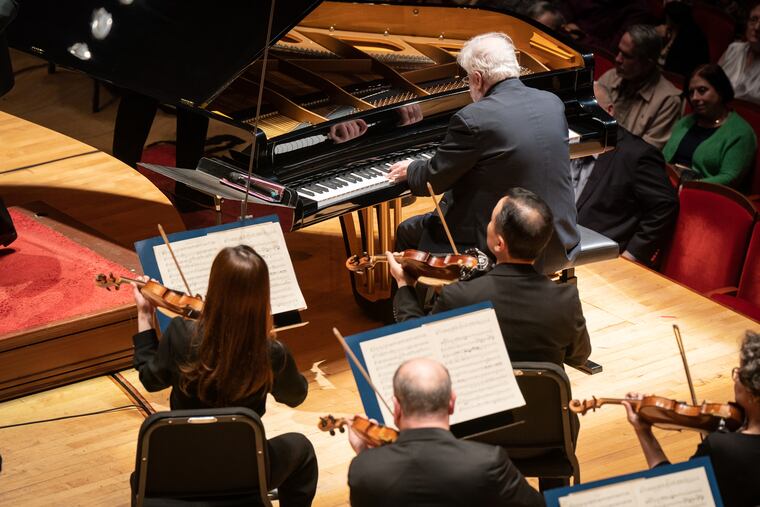A wacky piano with a curved keyboard made its debut at the Kimmel. But how did it sound?
The curved-keyboard piano in Mozart was on a program with Orff's popular Carmina burana.

Knockoffs of it are the reliable soundtrack of video games, and in car commercials it has become marketing shorthand for ferocious power. In the concert hall, the real Carmina burana is a more subtle animal, and yet even there it seems to arrive in bouts of aural cliché.
There’s no cure for this. Music leaves the pen and takes on a life of its own. But Friday afternoon’s performance of the piece had Fabio Luisi on the podium, and without doing anything radical, the conductor — and one of the vocal soloists in particular — made an unusually strong case for the work.
Carl Orff’s mid-1930s score may not be great, but it has moments of greatness, and they are not the same stretches of bombast that made the work the earworm that it is.
The other thing the program has going for it is the Philadelphia Orchestra, whose colors lush and vivid made the series of songs of love, lust, and drinking all it can be. Carmina is paired oddly on this program — repeated this weekend — with one of Mozart’s mature piano concertos, the No. 25 in C Major, K. 503, which, despite its familiarity, came with an intriguing twist: the local debut of a new piano.
To anyone sitting on the right side of the hall, the shiny black Cadillac of a piano doesn’t look too different from the normal Steinway concert grand. If, however, you caught sight of it from a seat on the hall’s left side, you’d notice a slight concave bend in the keyboard, angled ergonomically to accommodate the reach of the pianist’s arm spans.
The instrument was designed by late Kimmel Center architect Rafael Viñoly and built by Belgian piano maker Chris Maene, and while pianists will have to weigh in individually on its ergonomic (and other) value, the difference in its sound production was clear. Straight-strung rather than cross-strung (the strings in the body run perpendicular to the keyboard and don’t overlap with each other), the Maene-Viñoly Concert Grand is more subtle than a Steinway.
“It’s a fundamentally different way of building a piano,” said pianist Jonathan Biss after taking it for a spin last year.
“With any luck I’ll find the right notes,” Emanuel Ax told Friday’s audience. That’s never been a problem for the pianist, who was the perfect musician for this first outing of the instrument. The piano might not have held its own in Tchaikovsky or Brahms, but in the spare texture of Mozart’s judiciously scored concerto it spoke beautifully. It mostly has a refined, gauzy sheen that is a little less penetrating than a Steinway concert grand but still has presence. The extreme upper-register notes can get a little “pingy,” but there was a gorgeous consonance in some sections of the concerto among the piano’s sound, Ax’s touch and the orchestra’s strings — a rich, happy marriage.
Ax was the usual wonderful mediator of Mozart’s humor and grace, adding insightful embellishments and sensitive colorings, and the ensemble’s trumpet-timpani punctuation marks were especially lovely. An encore from Ax — say, Beethoven or Chopin — would have rounded out our view of this rare instrument, but there was none.
Carmina burana seemed like an oaf next to the Mozart (even spaced by intermission), but the performance was near ideal. Among its strengths: the impressive high notes of soprano Audrey Luna; the appropriately creepy characterization of the Swan by tenor Sunnyboy Dladla; the immediacy of the Mendelssohn Chorus of Philadelphia; and the sweet polish of a children’s choir drawn from the Philadelphia Boys Choir and Philadelphia Girls Choir.
Two forces stood out. One was baritone Sean Michael Plumb, who managed an intimacy that made the distance in the hall disappear. He rightly heard his role as a lieder singer, using a palette of vocal colors to underscore emotion and meaning.
The other great presence was the orchestra under Luisi. The 65-year-old Italian conductor, music director of the Dallas Symphony Orchestra, prevented stubborn ensemble problems that can happen in the piece. More significantly, he is expressive, and gets a burnished, mighty, and unified sound from this orchestra. Not everyone does. The group is playing second fiddle to pop singers and films quite a bit these days. It was good to be reminded that in Philadelphia the real star power is orchestral.
Additional performances: Saturday at 8 p.m. and Sunday at 2 p.m. in Verizon Hall, Broad and Spruce Streets. Remaining tickets are $76-$181. philorch.org, 215-893-1999.